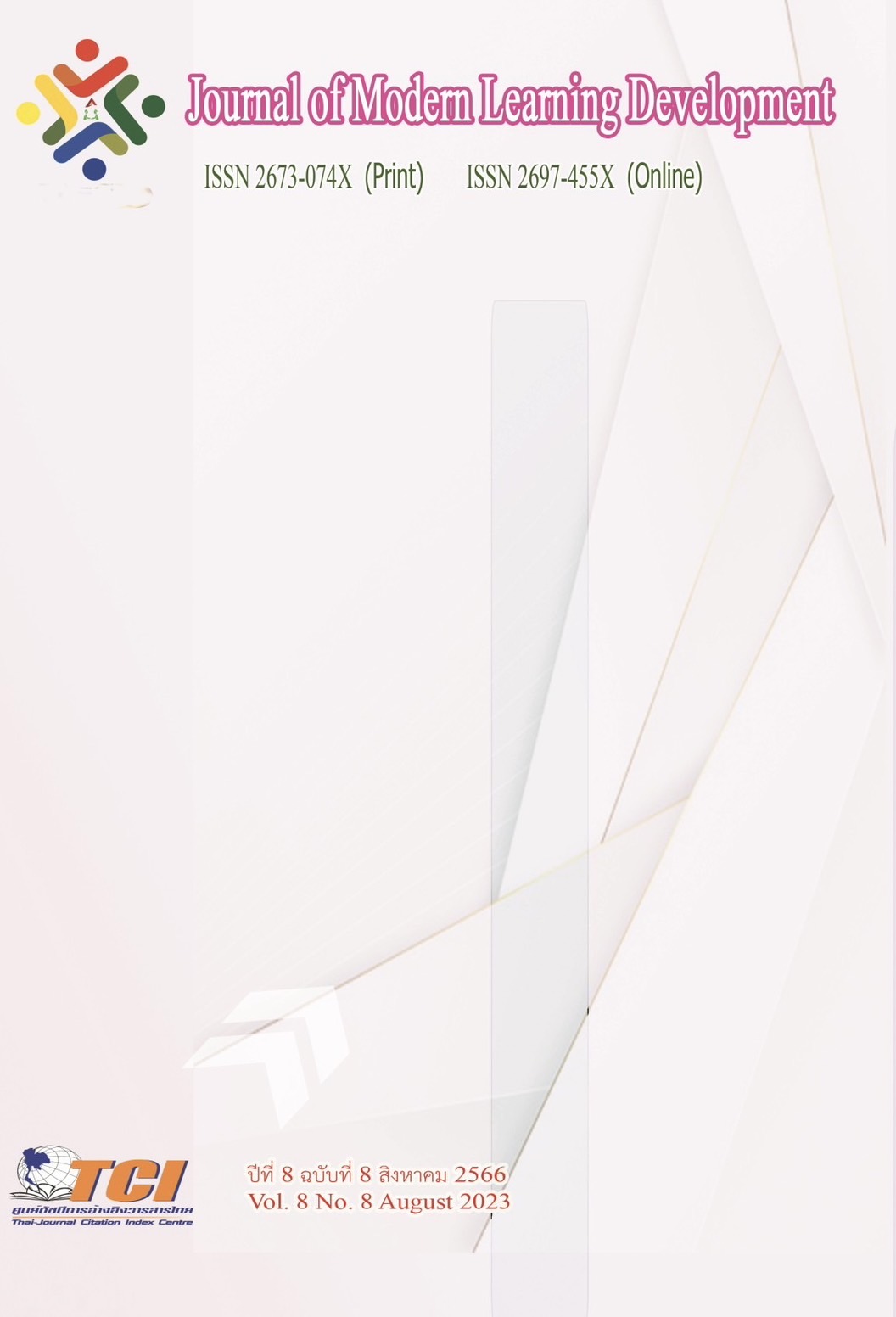The Effects of Learning Activities Through Web Applications Based on the Concept of Gamification Effected to Learning Engagement of Grade 6 Students with Different Academic Results
Main Article Content
Abstract
The purposes of this research were 1) to study the learning engagement of grade 6 students. 2) To compare students' learning engagement between groups with the different learning outcomes. 3) To compare the learning achievements of students with different grades before learning and after learning through a web application based on the concept of gamification. 4) To study the satisfaction of grade 6 students on learning activities through web application based on gamification concept. The sample group that used in this research were grade 6 students. By using the results of the previous semester as a criterion to classify students.
The research instruments were: 1) a web application learning activity plan based on gamification concept 2) The Achievement test 3) The assessment questionnaire of learning engagement 4) The questionnaire on students' satisfaction towards learning activities via web applications based on gamification concepts. The statistics used in data analysis were mean, deviation, t-test and one-way analysis of variance. 4) The questionnaire on students' satisfaction. The statistics used in data analysis were mean, deviation, t-test and one-way ANOVA.
The results of research were as follows: 1) the results of the study of student engagement was found that the engagement in learning had an increase in the mean post-learning, by the average of the total learning engagement of the students in the post-learning was at the highest level (= 4.52, S.D. = 0.68). 2) The results of comparing students' learning commitment between groups with the different levels of learning outcomes by using one-way ANOVA, was found that the learning commitment of students between groups with different levels of learning outcomes were different which be consistent with the assumptions.3) The comparison of students' learning achievement after learning through a web application based on the gamification concept found that the average learning achievement was increased after learning. The post-learning achievement was ( = 16.92, S.D. = 1.39). 4) The results of the study revealed that the student's satisfaction with the learning activities through the web application based on the gamification concept was at the highest level ( = 4.88, S.D. = 0.37).
Article Details
References
รัฐพล ประดับเวทย์. (2560). แนวทางการจัดกิจกรรมการเรียนรู้ด้วยเทคโนโลยีตามแนวคิดอนุกรมวิธานของ บลูม. วารสาร Veridian E-Journal: มหาวิทยาลัยศิลปากร. 10 (3), 1051-1065.
รัตตมา รัตนวงศา. (2559). การพัฒนารูปแบบการเรียนการสอนในสภาพแวดล้อมแบบเกมมิฟิเคชันโดยใช้การออกแบบเป็นฐานร่วมกับเครื่องมือทางทัศนะเพื่อส่งเสริมการรู้ทางทัศนะ และแรงจูงใจใฝ่ สัมฤทธิ์สำหรับนิสิตนักศึกษาระดับปริญญาบัณฑิต: จุฬาลงกรณ์มหาวิทยาลัย
ศูนย์จีนศึกษา. (2551). ความร่วมมือไทย-จีน ด้านการเรียนการสอนภาษาจีนในประเทศไทย. กรุงเทพมหานคร. ศูนย์จีนศึกษา: สถาบันเอเชียศึกษา จุฬาลงกรณ์มหาวิทยาลัย.
อุทุมพร ภักดีวงศ์. (2562) การพัฒนารูปแบบการเรียนการสอนภาษาอังกฤษเพื่อส่งเสริมความผูกพันของผู้เรียนและความสามารถทางการอ่านและการเขียนภาษาอังกฏษของนักศึกษาระดับปริญญาตรี . วิทยานิพนธ์มหาบัณฑิต. บัณฑิตวิทยาลัย: มหาวิทยาลัยธุรกิจบัณฑิตย์.
Fredricks, J. A., et al. (2011). Measuring student engagement in upper elementary through high school: A description of 21 instruments. National Center for Education Evaluation and Regional Assistance. Institute of Education Sciences.
Jing, W. (2011). Cognitive Style Influences Thai College Students’ Cooperative Learning in Chinese. Master’s degree: Shandong University.
Le, Y. (2012). Study on Chinese Learning Motivation of Thai Students. Master’s degree: Guangxi University.
Smiderle, R., et al. (2020). "The impact of gamification on students’ learning, engagement and behavior based on their personality traits. Smart Learning Environments. 7 (1), 3.
Simóes, J., Redondo, R. D., and Vilas, A. (2013). A social gamification framework for a k-6 learning platform. Computers in Human Behavior.
Zhengfang, M. (2012). Factors Affecting Thai Middle School Students’ Chinese Learning Performance: A Case Study of Joseph Upatham School. Master’s degree: Yunnan University.


